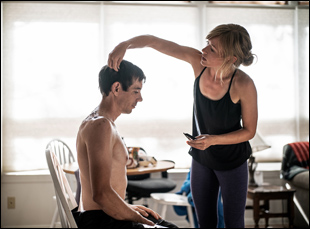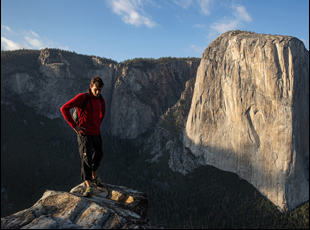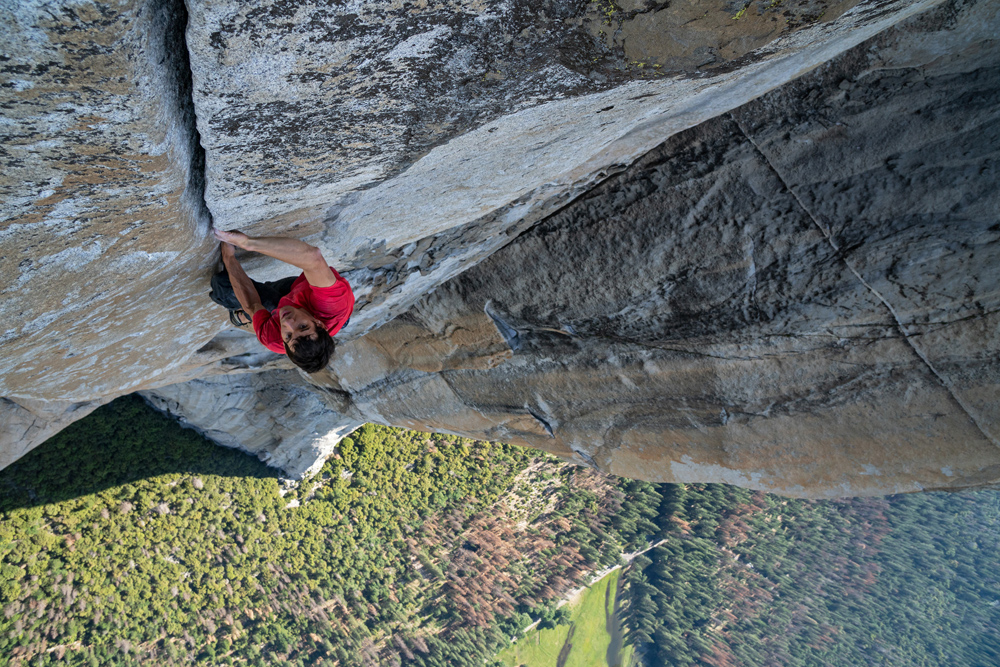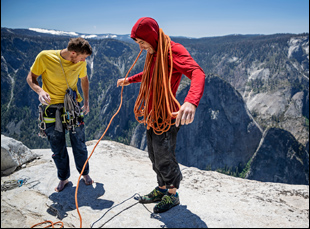You would think the most harrowing moment in “Free Solo,” E. Chai Vasarhelyi and Jimmy Chin’s awe-inspiring follow-up to “Meru,” would be somewhere on El Capitan, the 3000-foot tall rock wall in Yosemite National Park which Alex Honnold has long dreamt of scaling with his bare hands, though its slippery granite surface and daunting height have given pause to even the most experienced of climbers. In the case of Honnold, for whom it’s discovered that his amygdala requires more stimulation than most, this isn’t of much consequence, but put him in a department store with his girlfriend Sanni McCandless picking out refrigerators, confronted with the choice of how the swinging doors are arranged and you’ve got drama.
It’s certainly an adjustment for Honnold, who has long lived a modest life in a camper in order to pursue his passion for climbing, but as “Free Solo” wears on, you realize that he has two summits to conquer after an already accomplished career, one being El Capitan and the other letting his own walls down to allow himself a partner when both his personal and professional lives have insisted that he goes it alone. As gasp-inducing as Vasarhelyi and Chin’s work is in capturing the former, once again drawing on a seasoned crew that follows Honnold up El Cap with the additional weight of camera equipment on their back, it’s equally breathtaking to see how they get inside his relationship with Sanni, who he meets during a book tour stop in Seattle and gradually widens the single-minded climber’s horizons beyond the biggest mountains in the world.
After another type of adventure altogether criss-crossing North America in recent weeks after “Free Solo” premiered at the Telluride Film Festival, following by stops at the Toronto and Los Angeles Film Festivals, Vasarhelyi and Honnold were gracious enough to talk about how they pulled off the death-defying film, the difficulty of doing justice to the majesty of El Cap onscreen as well as the romance that unfolds as the climber prepares for his greatest challenge to date.
E. Chai Vasarhelyi: Jimmy Chin, my directing partner, has known Alex for over 10 years, and I had only met Alex socially, but what Alex does is extraordinary. He’s the only person in the world that can do it and what was interesting to us was that he’s so methodical and [his climbs are] well thought-out. There’s also this anecdote about Alex as a kid that he began climbing without ropes because it was scarier to speak to another person and ask them to be his partner than to go out there with no partner and no rope. That always brings this [feeling] into my chest [because] we all have fear like that in our lives and to be able to tell a story about that geeky kid who goes on to do what Alex does is remarkable. Everybody should be able to move through their fears and live a life of intention that way. We didn’t originally know that he was going to free solo El Cap, but when he told us, I was like, “Oh, that sounds like a great film!” Then Jimmy’s like, “That’s too scary. That’s too risky. We can’t do this.”
Alex, what’s scarier now to climb a mountain like El Cap or open up your life like this?
Alex Honnold: A little bit of both. [laughs] The idea of free soloing El Cap was always the scariest because you could actually die. But it was probably harder for me personally in some ways to open up my life and my relationship with Sanni and to have the film crew in my world. They’re just very different challenges [because] I’m very well-prepared for climbing challenges. I know how to undertake that. I don’t really know how to be a good boyfriend or have a good relationship while also being filmed and I definitely had no experience having hard conversations on film. I’m just like “whoa, this is a challenge.”
Most documentary subjects will tell me that they get less conscious of the cameras being there, but in this film, the camera crew becomes a concern just because they’re all hanging off a cliff with you. Did you feel them around more?
Alex Honnold: No, I think that was true [you lose sight of the camera], certainly after two years of filming together. At a certain point, you become friends with the cameramen and everyone feels like family. They’ve been spending so much time in your personal space, it’s like, “Cool, let’s hang out, and when everybody wraps up and leaves, you’re like, “Oh, I feel slightly lonely.”
E. Chai Vasarhelyi: He missed us. [laughs]
Alex Honnold: But as the film went on — and at least I had been a professional climber for 10 years, so I had some experience with being in front of the cameras — it was pretty tough, maybe even more so for Sanni because she had zero experience with filming when we first started dating and she first got incorporated into the film.
E. Chai Vasarhelyi: It was. But she’s a sport.
Chai, you and Jimmy became a couple on “Meru.” Did your own relationship with such an experienced mountain climber give you insight into what was unfolding between Alex and Sanni, where suddenly this guy is going refrigerator shopping?
E. Chai Vasarhelyi: My relationship with Jimmy absolutely informed this film in that I was particularly interested in articulating the female point of view in it. We got lucky because when we started making the film, Alex was internet dating and setting up dates on his book tour stops in every city, so I [thought], “Oh great, we’ve got a comedy on our hands.” And then he met Sanni, who is emotionally intelligent in a very unique way. She’s articulate about her feelings and also self-confident enough to be able to stand up for herself, but also try to love him for who he is and as a female character, that was wonderful. It was important to us always – and to Jimmy too, to make sure we’re doing right by that.

Alex Honnold: Yeah, because when we started dating, I’m [thought], “This seems great, but who knows where this is going to go and certainly [at the time] my climbing goals meant much, much more to me than this girl did. I was just meeting her. But then our relationship really changes over the course of the film. It’s funny because a 90-minute film doesn’t really do justice to two years of living with somebody and how much your relationship really changes.
E. Chai Vasarhelyi: And he’s come so far.
Alex, when it’s a movie about you, is there anything you wanted to come across?
Alex Honnold: Not really. I didn’t care that much about me. I really wanted El Cap to be properly conveyed. I wanted to see what I find to be the most inspiring wall in the world shown in the best possible light on the biggest possible screen because it’s been such a huge inspiration for me. I just wanted that to be properly shown so people would get it, that when you see El Cap and you see the climb, you’re like “Whoa. That does justice to the motivation behind it.”
Chai, does the experience of “Meru” make it any easier to plan for a film like this?
E. Chai Vasarhelyi: This is what Jimmy’s done for 20 years, so the how was less concerning than the what. The two films are quite different actually, but the way “Meru” informed it was that we knew the issues with trying to contextualize climbing, so Bob Eisenhardt edited both films and we knew what we didn’t need to talk about — it was actually nice that Alex climbs with no gear because we didn’t have to talk about the gear. [laughs] But how much we needed to share for a non-climber to understand what was happening.
Alex Honnold: I think that was one of the strengths of the film – that it doesn’t dive into climbing jargon or explanations.
E. Chai Vasarhelyi: We just let the language be the language. And Jimmy found this amazing team [to shoot the film] and as Alex was preparing, they were preparing and we were also editing at the same time, so getting to know the parts that are interesting narratively, it was like, “Let’s focus our efforts there.” But one of the hardest things [our camera crew] had was to insulate Alex from their own feelings [as he performed this dangerous climb].
It looked like you kept drone filming to a minimum, but I imagine that would be the easiest way to go about this.
E. Chai Vasarhelyi: It’s illegal in national parks.
Alex Honnold: So there’s no drone footage. Otherwise, it’d be super easy to shoot everything with a drone.
Wow.
E. Chai Vasarhelyi: Yes, our team is [comprised of] elite pro climbers and they’ve all filmed at Yosemite extensively, so they know the route really, really well. Hanging off the cliff is like second nature to them, the way that you and I would walk down the street.
You find a brilliant way in to show the planning that goes into it where Alex is going over his written schematics while you actually see the climb in montage. How did you connect those two things?
Alex Honnold: I was writing everything in my journal, and I wasn’t reading them aloud very often, but I had all kinds of lists that were very specific to the specific pitches and then some overview lists of the entire route. I was trying different ways to memorize [the routes]. I had done different stuff with my phone, like writing notes in my phone or taking pictures of certain things, just trying to find the best way to remember big sections of rock. But then mostly I would run that through in my head, like inner dialogue – “left hand, right hand, swing the hips, move the right foot, move the left foot…” [and it became] voiceover.
E. Chai Vasarhelyi: It’s like that classic scene in “Don’t Look Back.” D.A. [Pennebaker] asks Joan Baez to read out loud the review [of her performance]. It’s a documentary thing, [where] if you want to articulate someone’s inner thoughts, you ask your subject, “Can you read it to me?”
Alex Honnold: Yeah, [for those sequences it’s like] Bob [Eisenhardt, the editor] almost had to climb El Cap too. [laughs]
E. Chai Vasarhelyi: Yeah, we knew the narrative of the mountain really well, so we knew what [Alex] was talking about, and we shot it. One of the greatest challenges of making this film was [actually] how to contextualize El Cap in a way that showed it big enough because you still don’t get it when you see a picture, so [it became a question of] how to make it look formidable enough and show [Alex] being that small and how he’s moving around [the mountain]. We struggled for a while with different CG options and we couldn’t get it high resolution enough to get Alex in it, but then Google Earth gave us their imagery and our graphic people could use it [to] get these shots [where you can follow his progress on the mountain].
Alex Honnold: But even that still doesn’t quite compare to the real thing.
E. Chai Vasarhelyi: No, but it was such a big deal [for us as filmmakers], like how do you make El Cap scary enough? Because it is scary.
Alex Honnold: It is interesting because I was just in Yosemite with a publicist [for the film], who’s seen it 25 times, and the first time she saw El Cap, she was like, “Wow, I didn’t realize it was so big.”
E. Chai Vasarhelyi: It’s huge! The only things that do justice to it is when you’re looking down. That situation, at least for me, always does induce the height, when you’re off the wall and you’re seeing the trees — that’s when you get the scale. But it’s still impossible.
Alex Honnold: Yeah, and people who see the wall for the first time often are like “Oh, there are no people on it” because they don’t totally appreciate the scale. They expect them to be much bigger. Then when they realize the people are the tiny, tiny little black specks, they’re like “Oh…OH! It’s so big.” I think the final climb [does] capture the experience of climbing El Cap. It’s beautiful and it really does justice.

Alex Honnold: It’s much harder than climbing. [laughs] No, it’s been nice to see the positive reception to the film and see people appreciate the experience, to some extent, but that said, climbing in the gym [for me] is just not as fun as going to Yosemite.
E. Chai Vasarhelyi: We’re just very grateful. But still the best moment of all of this is when [Alex] actually made it [to the peak of El Cap] and the relief we felt all around, so we were just working to do justice to the story and it’s been very gratifying for audiences to receive it.
Because this climb was so private, by necessity — there’s only a small crew around you when you have this major achievement — is it interesting to be able to have your friends and family watch it for the first time?
Alex Honnold: Yes, it’s funny you say that because at the L.A. premiere, I had a lot more family and friends here because I’m from California, so my childhood best friend, who I’ve known since I was five and I’ve been deeply involved in his family my entire life, came to the film and afterwards, he [said], “I feel like I’ve kind of been a bad friend because I knew you were a professional climber and doing these things, but I never really understood what that meant.” I’ve known him for 25 years or a little more, so it is satisfying [to see him and] my sister and my mom, to some extent – for all my family and friends to get that sense of what I’ve been spending all my time on. I don’t think I’m particularly good at articulating why I love to climb or what exactly I’m doing. When I see family at holidays, [they’ll say], “Oh, what have you been doing?” I’m just like, “Oh, I’ve just been hanging out at Yosemite.” But when they see the film, they’re like “Whoa.” That’s been nice.
E. Chai Vasarhelyi: And that was a big “Meru” thing. For Jimmy and Conrad [Anker], especially, it was a way for people to understand what they did in a different way.
Alex Honnold: Yeah, because it’s easy to say “I went on an expedition of the Himalaya” and [people will say], “Oh, that sounds nice.” But then they see the film and they’re like, “Whoa! I didn’t know what Himalayan expedition climbing looked like. It looks rugged.”
E. Chai Vasarhelyi: It looks absolutely miserable! [laughs] And you starve.
Alex Honnold: [laughs] No, it’s character-building. That’s why Conrad has so much character.
“Free Solo” is now open in Los Angeles at the Arclight Hollywood, New York at the Angelika Film Center and Denver at the Landmark Mayan and Boulder at the Cinemark Century 16. A full list of theaters and dates is here.





